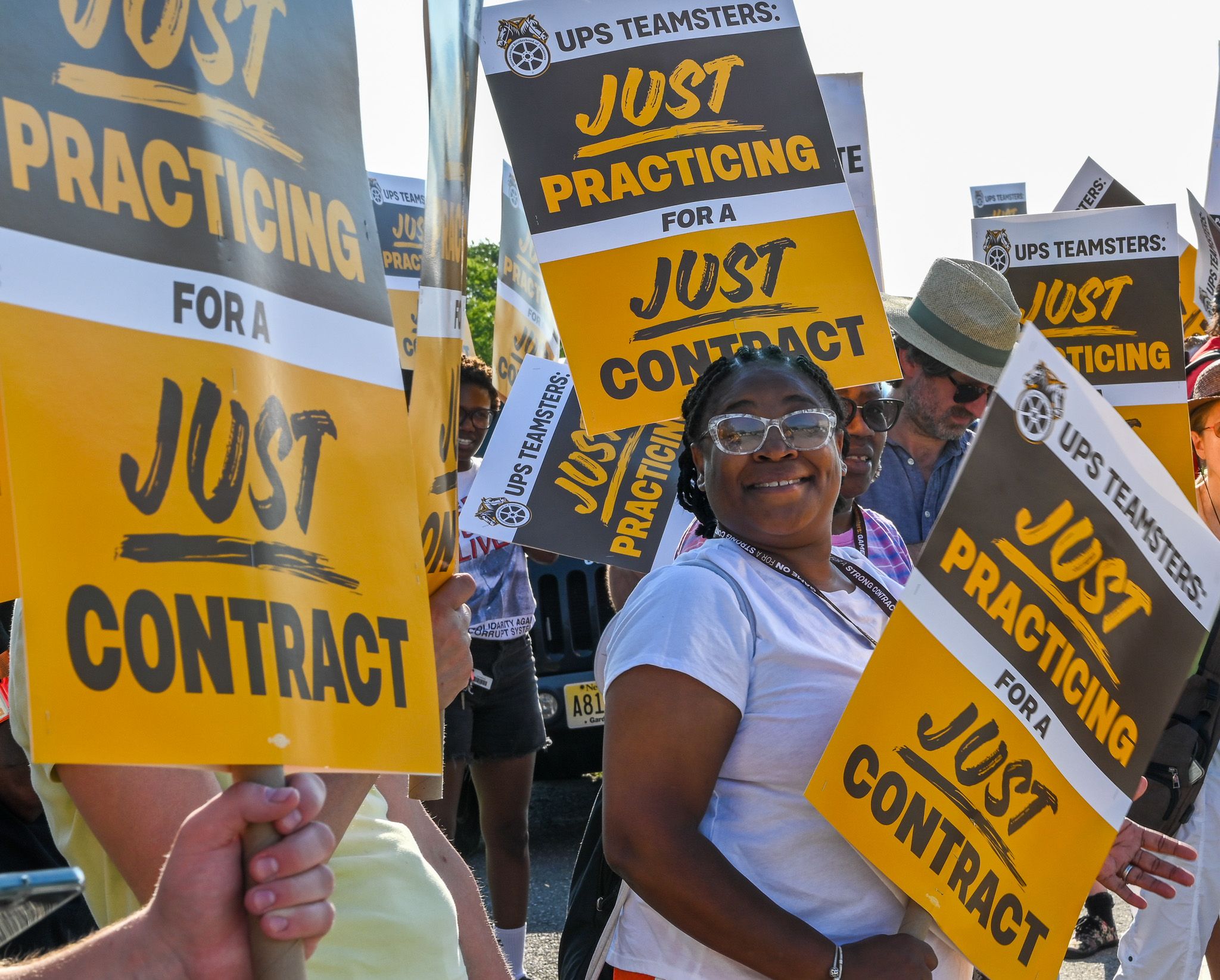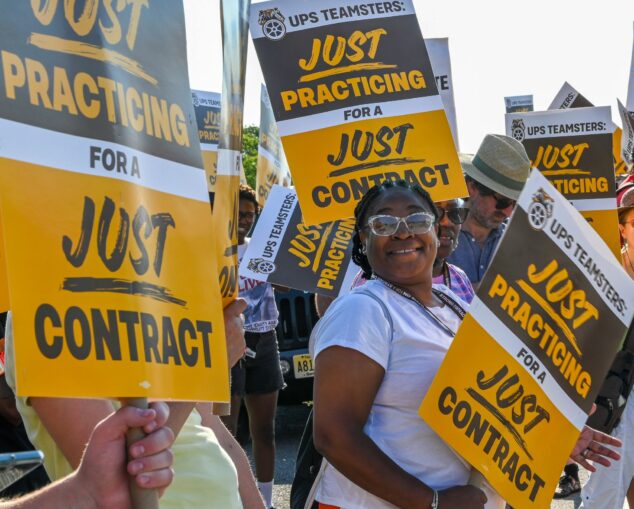

Teamsters ‘practice’ picket line and rally at the main gate of the Hog Island UPS facility in Philadelphia, July 13, 2023. WW Photo: Joe Piette
The 340,000 Teamsters union members at United Parcel Service have spent the past year preparing to strike when their contract expires Aug.1, but they probably won’t need to employ the strike weapon this go-around.


Teamsters ‘practice’ picket line and rally at the main gate of the Hog Island UPS facility in Philadelphia, July 13, 2023. WW Photo: Joe Piette
“We demanded the best contract in the history of UPS, and we got it,” Teamsters President Sean O’Brien announced July 25. “We’ve changed the game, battling it out day and night to make sure our members won an agreement that pays strong wages, rewards their labor and doesn’t require a single concession.” (teamster.org)
In the lead-up to Aug. 1, UPS workers engaged in scores of militant actions designed to unite and mobilize the rank and file. They held rallies and worksite meetings, wore T-shirts and buttons indicating their readiness to strike and held “practice pickets” in cities across the U.S.
In the face of such dogged determination to win the contract workers believed they deserved, UPS agreed to major improvements in pay, benefits and working conditions.
Among full-time UPS workers, the lower pay tier for lower-seniority employees known as “22.4” has been eliminated. The hourly pay gap between full-time and part-time workers has been narrowed, with current part-timers getting a 48% average pay increase over the life of the contract, and starting pay for future part-time workers raised substantially.
The agreement mandates “the creation of 7,500 new full-time Teamster jobs at UPS and the fulfillment of 22,500 open positions, establishing more opportunities through the life of the agreement for part-timers to transition to full-time work.”
Forced overtime on scheduled days off is no longer allowed. Critical health and safety improvements include fans or air-conditioning in UPS vehicles.
Driver-facing cameras and recording devices that subject workers to surveillance and intimidation will be eliminated. Pensions are significantly increased.
For the first time, UPS Teamsters will have Martin Luther King Day as a paid holiday. Pronouns referring to workers are changed from he/her or his/her to they and their and “gender identity” is added to the non-discrimination language.
The historic 1997 strike
The last UPS strike was 26 years ago. The Teamsters union, under the leadership of President Ron Carey, spent a year preparing the membership to take on the company and building support. Carey, who was first elected president in 1991 with the support of the reform caucus Teamsters for a Democratic Union (TDU), met with UPS unions in other countries.
When the strike began Aug. 4, 1997, there was broad labor and community solidarity. A Gallup poll showed two-thirds of the public backed the strike.
The biggest win of the 15-day strike was the combination of 20,000 part-time jobs to create 10,000 more full-time jobs. Pensions and wages were increased substantially. Limits were placed on subcontracting of Teamster jobs.
The ruling class never forgave Carey for his leadership in this historic strike, a rare win in a period of broken strikes and concession bargaining by class-collaborationist union leaders. The federal government charged him with illegally misusing funds to win reelection in 1996, and he was banned from running for union office. The ban was never overturned, even after he was found not guilty of all charges four years later.
With Carey out, Teamsters President James Hoffa Jr. made a number of contract concessions, including the creation of the 22.4 second tier classification in 2018. After members rejected this contract, the Hoffa leadership imposed it on the workforce, using language in the union constitution allowing this maneuver when the majority voting “no” isn’t above a certain threshold.
Infuriated, the Teamster rank and file booted the entire Hoffa-supported slate in national elections in 2021. The Teamsters United slate, led by O’Brien and General Secretary-Treasurer Fred Zuckerman and supported by TDU, swept the elections.
A new foundation to build upon
The new contract is significant in that it has zero givebacks and reverses decades of concessionary bargaining. And even without a strike, it could not have been won without the massive, militant mobilization of rank-and-file UPS workers and supporters.
The contract has some shortcomings. Future part-time workers will still make much less than current full-time workers and only a minority of them will be able to move into full-time positions. When the contract expires in five years, this situation can and should be fought over. The goal should be a path for every part-time worker to become full-time if they so choose, and for there to be hourly wage parity between full-timers and part-timers.
Getting Juneteenth, June 19, as a paid holiday — raised in these negotiations but not achieved — can be pushed for again.
UPS workers will vote on the tentative agreement from Aug. 3 until Aug. 22. While the contract is expected to pass, the vote will be important to assess in terms of what percentage of UPS workers actually vote and how many turn the contract down. Perhaps those voting “no” will be thinking they could have achieved a better contract if they had carried out the threat of a strike.
Of course, even the best contract is essentially a truce between a union, representing workers, and representatives of the capitalist class. It leaves intact the fundamental relationship between the exploited and their exploiters. But when the working class engages in militant, united struggle with the ruling class, it helps to hasten the day of the “final conflict” that will do away with class antagonisms altogether.
Raposo is a Portuguese Marxist analyst, editor of the web magazine jornalmudardevida.net, where this article…
By Alireza Salehi The following commentary first appeared on the Iranian-based Press TV at tinyurl.com/53hdhskk.…
This is Part Two of a series based on a talk given at a national…
Educators for Palestine released the following news release on July 19, 2025. Washington, D.C. Educators…
On July 17, a court in France ordered the release of Georges Abdallah, a Lebanese…
The following are highlights from a speech given by Yemen’s Ansarallah Commander Sayyed Abdul-Malik Badr…